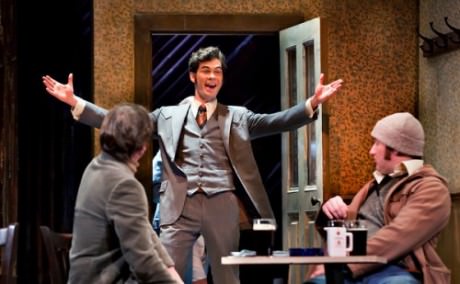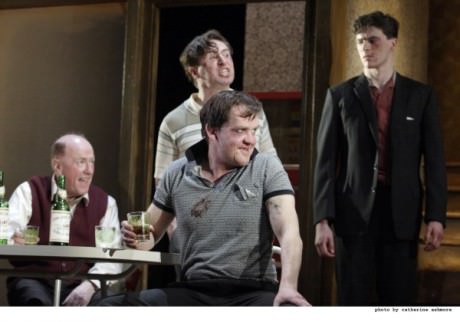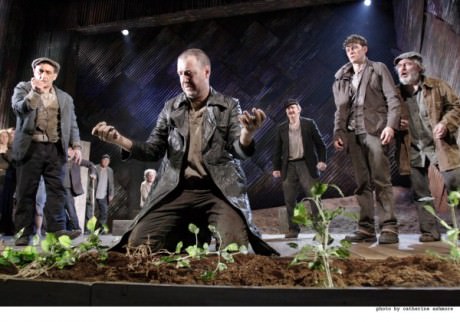One of the great things about living in Washington, DC is that we have access to an assortment of international theatrical productions most of which are presented by the John F. Kennedy Center for the Performing Arts. This month is no exception. Druid, one of Ireland’s most respected theatre companies, culminated its US tour of DruidMurphy, a cycle of three plays by the venerable Irish playwright Tom Murphy, at this great performing arts institution this week. Collectively, Conversations of a Homecoming, A Whistle in the Dark, and Famine, explore the Irish experience over three different decades across two centuries – the 1970s, the 1960s, and the 1840s. Common themes emerge although they encompass three distinct stories. Murphy explores the depths of human depravity and desperation as he also considers the concept of home – what it is and what it means to leave it. Druid’s presentation of all three plays, directed by Garry Hynes, is immensely strengthened by some extraordinary ensemble acting.

Conversations of a Homecoming, set in the 1970s, centers around an Irish man coming home again after ten years of trying to achieve success as an actor in the United States’ theatre mecca of New York City. Upon returning home, Michael (Marty Rea) meets up with friends in a decrepit pub (aptly named “The White House”) and over many, many drinks, they engage in a long conversation that leaves them grappling with the changes that have occurred since they were all together. Michael realizes that he’s no longer home and the others also internalize the changes in their own lives. Of the three plays, Conversations of a Homecoming is the most esoteric. Laden with powerful image-filled language which provides deep insight on the human condition, this play is also (quite intentionally) scant on actual plot. A commendable ensemble of actors (with standout performances by Marty Rea and Eileen Walsh as Betty) expertly traverses the dense dialogue and, as tensions escalate and they consume more and more alcohol, make apparent the dangerous direction of the conversation, which ends in physical altercations. With a powerful yet quiet ending, this play packs a powerful punch.

The 1960s era A Whistle in the Dark, focuses on the plight of Michael Carney (Marty Rea) who has left Ireland for England. Living with his English wife Betty, his world is turned upside down when his brothers and fathers come to his home. Deeply-seeded family tensions give rise to explosive fights – both emotional and physical. Betty (played by the marvelously versatile Eileen Walsh) is caught in the middle and eventually has to contemplate whether to stay or leave her home even if it means setting out on her own. Although the conflict between the men is a central part of the script, Murphy also, at the same time, uses the character of Betty to explore the place of the female in this Irish family and paints a bleak picture of her options in a male-dominated society. This idea is explored briefly in Conversations of a Homecoming, but is treated in a more complex way here in that we are able to also see Betty’s perspective on what’s happening within the family structure. For that reason, it’s much more compelling and interesting (at least for me). This production also includes incredible ensemble acting. All actors are uniformly excellent, but Niall Buggy gives a standout performance as the cowardly yet explosive father, Dada, who refuses to take any responsibility for what happens on the dark night when all of his sons are together again. His final scene, in particular, is exemplary of his obvious acting talent.

The most intense, and I think compelling, play of the three is Famine. When potato crops fail in 1840s’ Glanconnor Village, a community is faced with some difficult decisions – leave the homeland for possibly better economic prospects elsewhere or face the increasingly realistic prospect of death. As they grapple with starvation and all of its emotional and physical components, the divide between the powerful and powerless becomes even wider. Individual and collective decisions on what to do are only left to a few and many are left to suffer. Here, gender inequalities are also explored in addition to inequalities based on socio-economic status. Murphy gives us a textured and layered depiction of the impact that famine has on the individual and the collective group and what some humans will do to save themselves. Like in the other two plays, violence is seen as a potential answer to problems although it certainly can’t fix them. Famine has the largest cast of the three plays at 15-members and every actor rises to the immense challenge of conveying unimaginable despair and anger. It would be difficult to call out standout performances in this play, but Garrett Lombard (Malachy O’Leary) and Beth Cooke (Maeve Connor) give some of the most nuanced portrayals of their characters’ plights. If you can only see one of Murphy’s plays (of the three presented here), I’d certainly recommend this one.
Although the acting is certainly the highlight as well as the visceral language that Murphy employs, Druid’s production values are also first-rate.The lighting design (Chris Davey), sound design (Gregory Clarke), and music (Sam Jackson) is minimal, but the subtle changes, particularly at the end of the plays, highlight when the characters realize they’re resigned to deal with their lives and can’t change those circumstances. Joan O’Clery’s costumes reflect both time and place as well as, in some cases (for instance in Famine), the characters’ socio-economic status. The detailed sets, constructed under the direction of Francis O’Connor, range from a pub, to a modest English home, to potato fields to government buildings; they are functional and also do well to establish atmosphere. Although the Famine set design is the most visually-striking and abstract, all are used to their full effect in each production.
These three plays are not the most accessible of the Irish plays I have witnessed, but appreciators of fine acting and expertly woven dialogue will likely appreciate them. Those concerned with socio-psychological commentary are also likely to appreciate the insight they collectively provide on humanity – warts and all.
Running Times: Conversations of a Homecoming runs one hour and 50 minutes, with no intermission. A Whistle in the Dark runs two hours and 33 minutes, with an intermission. Famine runs two hours and 44 minutes, with an intermission.
DruidMurphy played at The John F. Kennedy Center for the Performing Arts – 2700 F Street, NW, in Washington, DC from October 17-20, 2012. For tickets to other upcoming performance in the 2012-2013 The Kennedy Center theatre season, call the box office at (202) 467-4600, or purchase them online.




